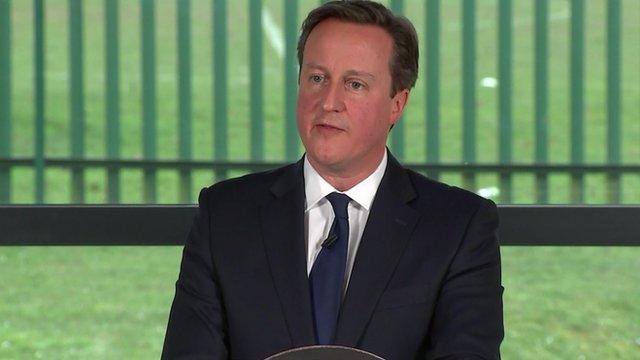Free schools: David Cameron pledges 500 more by 2020
- Published
David Cameron called the free school programme the "most successful schools programme in recent British history"
At least a further 500 free schools would be opened in England in the next five years under a Conservative government, David Cameron has pledged.
He committed his party to creating an extra 270,000 school places in free schools, if re-elected, by 2020.
The prime minister says these state-funded, start-up schools are "raising standards and restoring discipline".
Shadow Education Secretary Tristram Hunt says free schools lead to school places where they are not needed.
Speaking in west London, Mr Cameron announced that 49 more free schools had been approved and promised a further expansion if re-elected in May's general election.
The Conservatives are the "only party that's opening up the education system so we can get more good places for your children", said Mr Cameron.
"You will see the continuation of the free schools programme at the rate you've seen in the last three years."
Free schools "are not only outperforming other schools, but they are raising the performance of those around them, meaning more opportunities for children to learn the skills they need to get on in life," said Mr Cameron.
He also revealed his relief that his own daughter had "got a place at a good state secondary school", believed to be Grey Coat Hospital School.
"It's nerve-wracking enough watching your eldest go from junior to secondary school," he said.
'Raising performance'
Free schools, both primary and secondary, are set up by academy sponsors, charities, teachers and groups of parents, and operate outside local authority control. Academy sponsors include academy trusts, faith groups, universities and companies.
Mr Cameron described free schools as "independent schools within the state sector" - and with those announced on Monday there will be more than 400 open or approved, with 230,000 places.
If Conservative plans were implemented in the next Parliament, there would be 900 free schools, more than one in 30 state schools, with about 500,000 places.

Analysis
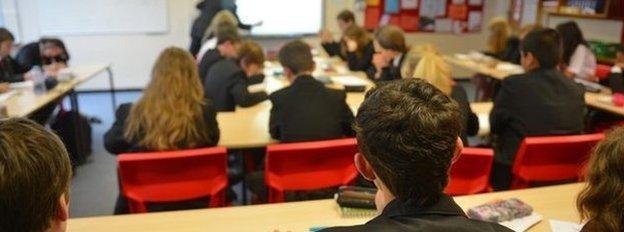
By Hannah Richardson, education reporter
Arguably one of the most controversial of the coalition's education policies, the free school programme is much more than giving parents and teachers the right to set up their own schools.
The complexities of running a school mean many of these new state-funded, but independently-run, schools are actually led by academy chains and education companies.
And the crucial rule that any new school, even in school-place squeeze areas, has to be a free school or academy, has led to an impasse in school-place planning in some districts.
Indeed, some local councils have struggled to find organisations to set up schools where they are needed.
The government cites figures suggesting 70% of inspected free schools are rated good or outstanding.
And supporters argue free schools offer choice and quality, as well as new school places, and drive up standards in other schools as a result.
But with a handful of high-profile cases of free schools failing within months of opening, question marks have been left hanging over these claims.

Labour has promised to cancel the free schools programme, saying that it diverts funds away from creating extra places where there is the greatest shortage.
"Instead of focusing on the need for more primary school places, David Cameron's government has spent £241m on free schools in areas that already have enough school places," said shadow education secretary Tristram Hunt.
"The result is a 200% increase in the number of infants taught in classes of more than 30."
Free schools in England
408
free schools approved or open
500
more planned within 5 years under Conservatives
-
255 free schools currently open
-
163 approved or open free schools are secondaries
-
154 approved or open free schools are primaries
-
190 approved or open free schools are in London and the south east
David Laws, the Liberal Democrat schools minister, attacked plans to expand free schools.
"Tory plans to build 500 new free schools would blow a giant £4bn hole in the school buildings budget," said Mr Laws.
"This would condemn thousands more children to inadequate and crumbling classrooms and jeopardise our efforts to ensure there are enough school places."
Parent-led?
Research published by the Policy Exchange think tank, external claimed the extra competition from free schools raises academic standards in nearby under-performing schools.
For each of the 171 schools in its study, it looked at exam results in the three "similar" schools that were nearest.
Jonathan Simons, head of education at Policy Exchange, told BBC Radio 4's Today programme that lower-performing schools had shown an "association of increased results" over and above the results in the same type of schools which were not near a free school.
Labour's Tristram Hunt says free schools are often in the wrong places
Dr Rebecca Allen, director of think tank Education Datalab, said the sample size was too small.
"When you have really small sample sizes, you should just be looking at main average effect across all neighbouring schools, " she said.
And that measure did not show any impact, she said.
Kevin Courtney, deputy general secretary of the National Union of Teachers, said the study revealed that the push for more free schools was not really "parent-led" but was now "dominated" by academy sponsors.
Education Secretary Nicky Morgan says free schools are popular and effective
Natalie Evans, director of the New Schools Network, which supports the opening of free schools, said free schools encouraged other schools "to raise their game" and should be targeted in all areas.
The Department for Education said that for the first time, the new wave of free schools would be able to receive capital funding to provide nursery places for two to four year olds.
Among the new free schools announced were the Green School for Boys in Isleworth and Brentford; the Northampton International Academy; the Great Western Academy, Swindon; the New School for Harrow; Swindon Church of England Secondary School; Cheadle Hulme Primary School, Stockport; and Bishop Chavasse School, Tonbridge, Kent.
- Published25 February 2015
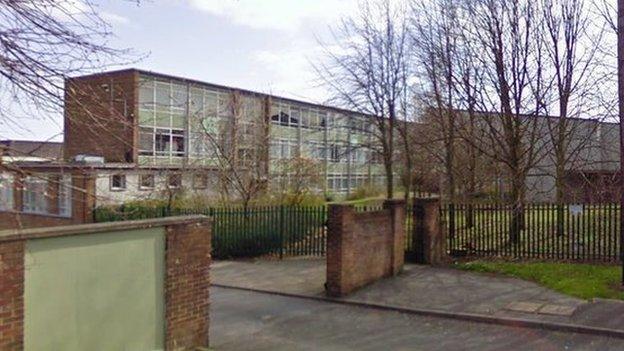
- Published2 February 2015
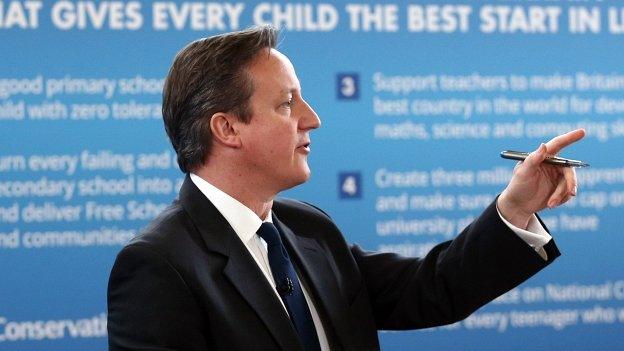
- Published9 March 2015
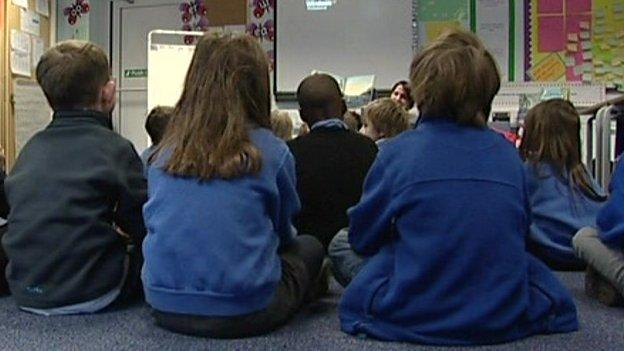
- Published9 March 2015
